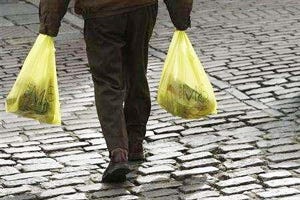Delhi to implement plastic bag ban
The Delhi government will impose a blanket ban on the manufacture, sale, storage and use of plastic bags in a region that includes India's capital.The proposal was passed during a cabinet meeting where officials said there will be "zero tolerance" even to the use of plastic to cover or package magazines, invitation cards, and greeting cards.In 2009, Delhi banned the use of plastic shopping bags, but there has been little success enforcing the ban, due to loopholes, according to reports.
September 12, 2012
The Delhi government will impose a blanket ban on the manufacture, sale, storage and use of plastic bags in a region that includes India's capital.
The proposal was passed during a cabinet meeting where officials said there will be "zero tolerance" even to the use of plastic to cover or package magazines, invitation cards, and greeting cards.
In 2009, Delhi banned the use of plastic shopping bags, but there has been little success enforcing the ban, due to loopholes, according to reports.
 The new ban has been extended to include all plastic bags, even those made of virgin or biodegradable plastic of 40 microns or more thickness, which had previously been permitted, The Times of India reports. However, plastic bags required for medical waste will be exempt.
The new ban has been extended to include all plastic bags, even those made of virgin or biodegradable plastic of 40 microns or more thickness, which had previously been permitted, The Times of India reports. However, plastic bags required for medical waste will be exempt.
Delhi produces about 5% of India's total amount of packaging waste even though its population only represents 1.5% of the country, according to a case study by the South Asian Network for Development and Environmental Economics (SANDEE).
"Plastic litter can also lead to clogged drains, which result in sanitation, flooding and sewage problems. In addition, plastic bags can harm animals through ingestion and the incineration of plastic bags pollutes the air and releases toxic substances," the study stated.
The case study, published in December 2011, assessed the impact of a number of complementary approaches to the plastic ban in Delhi.
The study concluded that in developing countries with little enforcement capacity, "a blanket ban may not be the best possible solution to the plastic bag challenge. A combination of strategies might be required to create an incentive-based system for the consumer and the retailer."
About the Author(s)
You May Also Like


